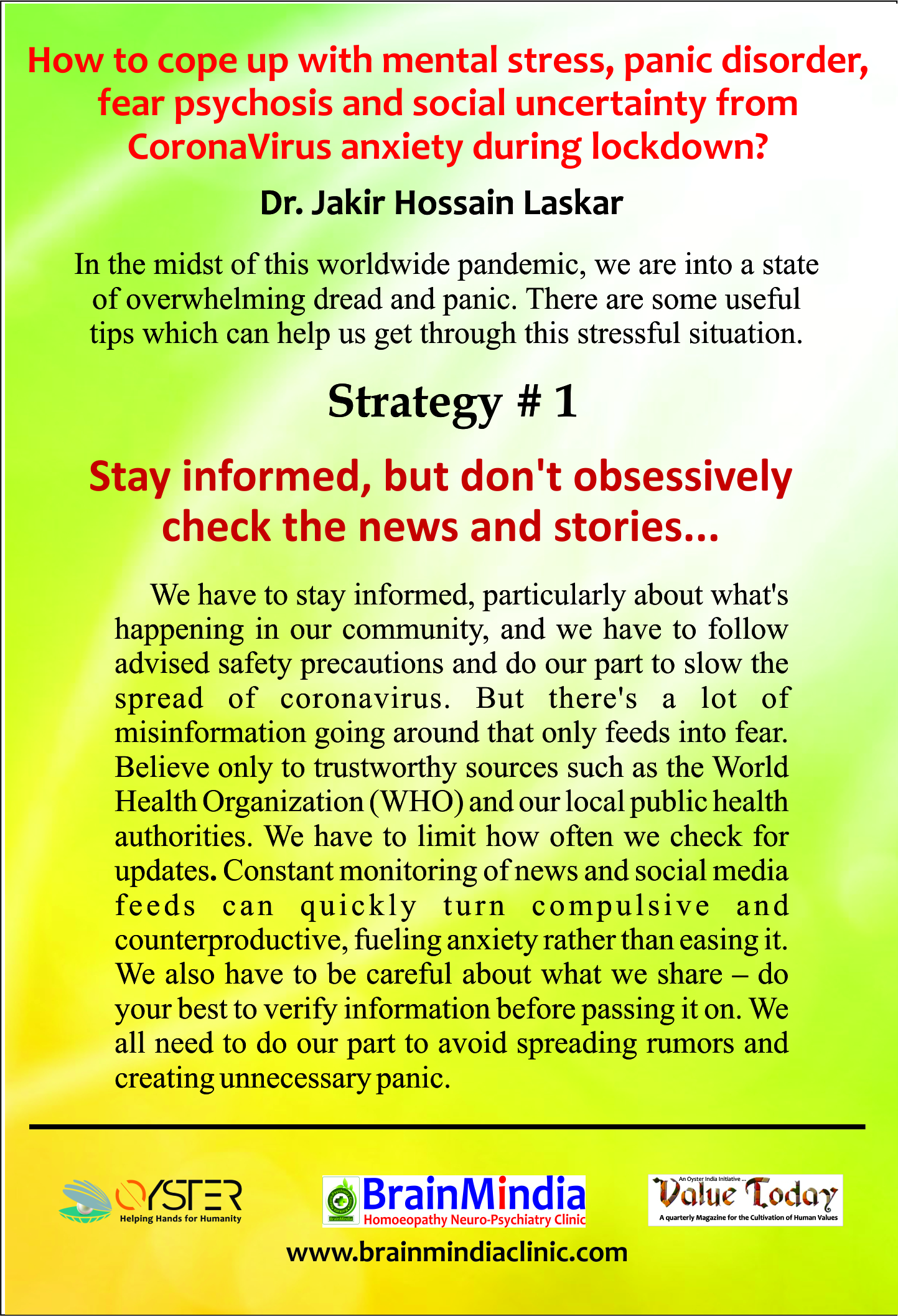
How to cope up with mental stress, panic disorder, fear psychosis and social uncertainty from CoronaVirus anxiety during lockdown?
Author : Dr. Jakir Hossain Laskar, PhD
In the midst of this worldwide pandemic, we are into a state of overwhelming dread and panic. There are some useful tips which can help us get through this stressful situation.
1. Avoid overconsumption of electronic, print and social media – Try to limit your consumption of media stories related to the virus outbreak. Medical scientists and public health officials are working overtime to better understand the virus and are looking at ways to limit its impact. Trust in their work and efforts.
2. Stay informed, but don’t obsessively check the news and stories – We have to stay informed, particularly about what’s happening in our community, and we have to follow advised safety precautions and do our part to slow the spread of coronavirus. But there’s a lot of misinformation going around that only feeds into fear. Believe only to trustworthy sources such as the World Health Organization and our local public health authorities. We have to limit how often we check for updates. Constant monitoring of news and social media feeds can quickly turn compulsive and counterproductive, fueling anxiety rather than easing it. We also have to be careful about what we share – do your best to verify information before passing it on. We all need to do our part to avoid spreading rumors and creating unnecessary panic.
3. Only focus on the things you can control – We need not focus things outside of our control. If we focus on questions with unknowable answers and circumstances outside of our personal control, this strategy will get us nowhere. We will only feel stressed, panicked and frightened. We can’t control how severe the coronavirus outbreak is in our city or town, but we can take steps to reduce our own personal risks, such as, washing our hands frequently (for at least 20 seconds) with soap and water or a hand sanitizer that contains at least 60% alcohol, avoiding touching our face (particularly our eyes, nose, and mouth), staying home as much as possible, even if we don’t feel sick, avoiding crowds and gatherings of 10 or more people, avoiding all non-essential shopping and travel, keeping 6 feet of distance between yourself and others when out, getting plenty of sleep, which helps support our immune system, and all recommendations from healthcare authorities.
4. Take good care of your health and spirit – Practice self-care in the face of this unique disruptions caused by the coronavirus pandemic. (a) Maintain a routine as best you can. Even if you’re stuck at home, try to stick to your regular sleep, meal, or work schedule. This can help you maintain a sense of normalcy. (b) Take time out for activities you enjoy. Read a good book, watch a comedy, play a fun board or video game, make something – whether it’s a new recipe, a craft, or a piece of art. It doesn’t matter what you do, as long as it takes you out of your worries. (c) Get out in nature, if possible. Sunshine and fresh air will do you good. Even a walk around your neighborhood can make you feel better. Just be sure to avoid crowds, keep your distance from people you encounter, and obey restrictions in your area. (d) Find ways to do exercise. Staying active will help you release anxiety, relieve stress and manage your mood. If you’re stuck at home, look online for exercise videos you can follow. There are many things you can do even without equipment, such as yoga, pranayama and exercises that control your own bodyweight. (e) Avoid self-medicating. Be careful that you’re not using alcohol or other substances to deal with anxiety or depression. If you tend to overdo it in the best of times, it may be a good idea to avoid for now. (f) Take up relaxation practice. When stressors throw your nervous system out of balance, relaxation techniques such as deep breathing, meditation, and yoga can bring you back into a state of equilibrium. Regular practice delivers the greatest benefits, so see if you can set aside even a little time every day.



















